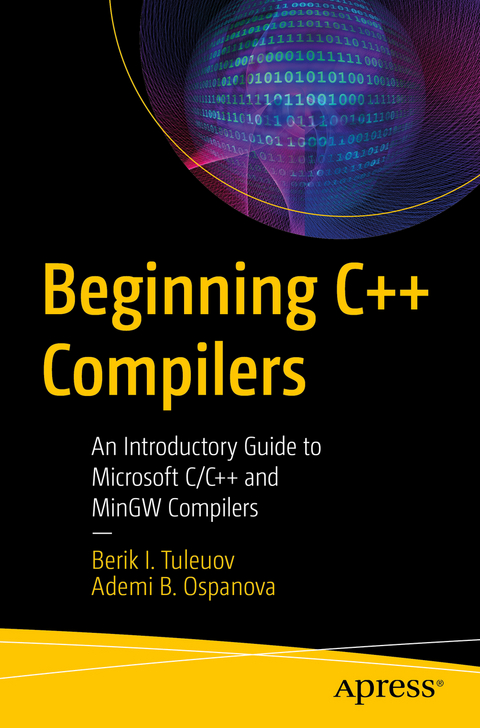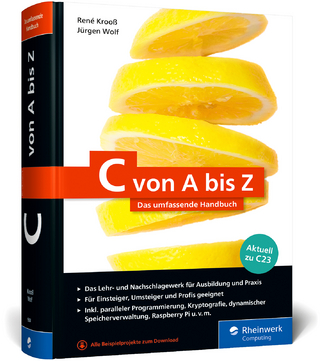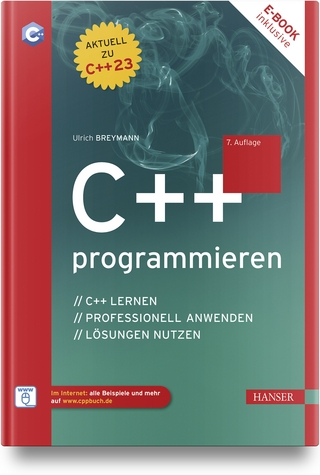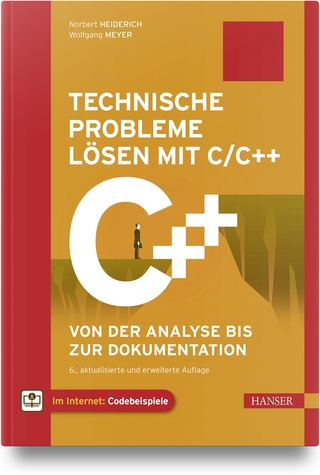
Beginning C++ Compilers
Apress (Verlag)
978-1-4842-9562-5 (ISBN)
The authors provide an easy way to deploy Microsoft C/C++ compiler: with no disk space headache and hardware resources lack. The method described saves significant time since software can even be deployed on removable devices, such as flash sticks, in an easy and portable way.
It is achieved by using Enterprise Windows Driver Kit (EWDK), single big ISO image, which can be mounted as virtual device and used directly without any installation. EWDK contains everything from Visual Studio except IDE. EWDK also allows to use MASM64 (Microsoft Macro-Assembly) and C# compilers.With the aid of the MSBuild System, one can compile Visual Studio Projects (.vcxproj) and Solutions (.sln) without even using Visual Studio! Similarly, MinGW compilers can be deployed from 7z/zip archives, simply by unpacking into appropriate location. Both Microsoft C/C++ and MinGW compilers can be used as portable software-an approach that does not require administrative privileges at all.
What you'll learn- Rapid installation of modern Microsoft C/C++ and MinGW compilers.
- How to prepare reusable and portable Microsoft C/C++ and MinGW compilers suite on removable media (flash stick, CD/DVD).
- How to use Microsoft C/C++ and MinGW compilers even on old/slow computers without standard installation.
- How to build under Windows the libraries originally designed for Unix-systems.
- Learn to run multiple versions of these compilers at the same time.
Who This Book Is For
Reader of all skills who wants to save time and efforts to start to work with C++. Also useful for scientists who are not familiar with software installation.
Berik Tuleuov is a Senior Lecturer at L. N. Gumilyov Eurasian National University, Nur-Sultan, Kazakhstan. He’s a researcher and mathematician who uses computers for scientific computations and designing algorithms. He runs a topic on The AIFC Tech Hub (a meeting point for global startups, entrepreneurs, investors, industry’s top experts and talent pool) about Microsoft C/C++ compilers. This forum has more than two million registered participants. He regularly takes part in academic and industry conferences, mainly on computer science topics. Interests include programming languages, algorithms and data structures, concurrent (parallel) programming, scientific programming, (La)TeX Typesetting System, and data visualization. Ademi B. Ospanova is an Associate Professor in the Department of Information Security at L. N. Gumilyev Eurasian National University. She is the author of many courses in the field of IT technologies. She is developer of educational programmes of all levels of the university on information security. In the educational process and projects she uses her own software and libraries in C/C++, C#, Java, Prolog, R, Python, Solidity, works in Mathematica, Maple, Sage packages. She also has her own website, including hosting on her own server. She manages grant and initiative research projects, and her Masters and PhD students are winners of national scientific competitions. Ademi also gives courses and consultations on cryptography and programming to specialists from various companies."
Part I. Operating Systems and Platforms
Introduction
Chapter 1. Files and Devices
Chapter Goal: General Information on Files and Devices
File types and formats
Executable and batch files
System commands
Mounting Devices
Virtual Devices
Chapter 2. Software Installation
Chapter Goal: Description of Software Installation Ways
Installation packages (msi)
Installing with archives
Installing from sources
Portable Installation
Overview of Installation Methods
Best Software Installation Practices for Windows systems
Chapter 3. Programming Languages and Software
Chapter Goal: Overview of Programming Languages
Programming Languages
C/C++
Fortran
Assembly
Part II. Programming Environments
Chapter 4. General Build Information
Chapter Goal: Description of Software Building on Various Platforms with Various Compilers
Unix systems
GNU Autotools (GNU Build System)
Windows systems
nmake Utility
Visual Studio .vcxproj and .sln files
MSBuild Build System
Cygwin
Cross-platform topics
Chapter 5. Some Useful Open Source Utilities
Chapter Goal: Overview of Handy Tools
Far Manager
Default Installation
Easy Installation
Usage
7z
Default Installation
Easy Installation
Usage
Notepad++
Default Installation
Easy Installation
Usage
lessmsi
Easy Installation
Usage
WinCDEmu
Easy Installation
Usage
Chapter 6. Command-Line Interface
Chapter Goal: Description of Important Shell Environment
Command Interpreter
Environment Variables
Access management
Chapter 7. Integrated Development Environments and Editors
Chapter Goal: Various Visual Development Tools
Microsoft Visual Studio
Qt Creator
Code::Blocks
Geany
Kate
Chapter 8. Minimal Systems
Chapter Goal: Overview of Handy Build Subsystems
MSYS
Easy Installation
Some Tips
MSYS2
Default Installation
Easy Installation
CMake
Default Installation
Easy Installation
Chapter 9. Compilers
Chapter Goal: Various Ways of Compilers Installations
GCC/MinGW
Default Installation
Building from the sources
Easy Installation
Microsoft C/C++
Default Installation
Easy Installation (without Visual Studio) with EWDK
Intel C/C++
Part III. Building and Using Libraries (A. B. Ospanova, co-author)
Chapter 10. Libraries
Chapter Goal: Libraries, How to Treat Them
Dynamic and Static Libraries
Building Libraries
Creating User Libraries
Chapter 11. Using Libraries
Chapter Goal: Overview of Using Libraries
Linking with Static Libraries
Linking with Dynamic Libraries
Using Libraries from Source Code
Chapter 12. GMP (GNU Multiprecision Library)
Chapter Goal: Using GMP Library
Building
Example: Computation of 10 000 000!
Chapter 13. Crypto++
Chapter Goal: Using Crypto++ Library
Building with MinGW
Building with Microsoft C/C++ Compiler
Example: AES Implementation
Chapter 14. Process Hacker
Chapter Goal: Using Process Hacker Utility
Building with Microsoft C/C++ Compiler
Building Driver
Building Utility
| Erscheinungsdatum | 11.01.2024 |
|---|---|
| Zusatzinfo | Illustrationen |
| Verlagsort | Berkley |
| Sprache | englisch |
| Maße | 155 x 235 mm |
| Gewicht | 358 g |
| Einbandart | kartoniert |
| Themenwelt | Informatik ► Programmiersprachen / -werkzeuge ► C / C++ |
| Mathematik / Informatik ► Informatik ► Software Entwicklung | |
| Informatik ► Theorie / Studium ► Compilerbau | |
| Schlagworte | C++ Compilers • C++ Quick Installation • C++ Quick Start • Enterprise Windows Driver Kit • EWDK • libraries • MinGW • MSYS • Portable C++ Compiler • Scientific Computations |
| ISBN-10 | 1-4842-9562-5 / 1484295625 |
| ISBN-13 | 978-1-4842-9562-5 / 9781484295625 |
| Zustand | Neuware |
| Haben Sie eine Frage zum Produkt? |
aus dem Bereich


